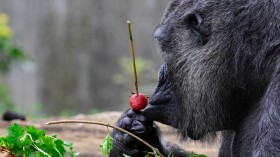Some fish species, such as salmon, are known for returning to their birthplace to have young of their own. But a nearly two decade-long study in waters off the Bahamas reveals the behavior for the first time in sharks.
Female lemon sharks (Negaprion brevirostris) born in the the Bimini lagoon region were documented returning there 15 years later to have young of their own.
The ongoing study, which began in 1995, has to-date resulted in the capture, tagging and release of more than 2,000 baby sharks. It takes lemon sharks between 15 and 17 years to become sexually mature. They can have as many as 18 pups in a litter.
"We found that newborn sharks captured in the mid-1990s left the safety of the islands when they were between five and eight years old," said The Field Museum's Kevin Feldheim, the lead author of the study published in the journal Molecular Ecology.
"Yet, despite leaving and visiting many other islands in their travels, these sharks 'remember' where they were born after a decade of roving, and are able to find the island again when they are pregnant and ready to give birth," he said.
It has long been suspected that sharks may return to their native waters to give birth, but due to the difficulties in tracking sharks from infancy to adulthood, conclusive evidence that it happens had not been obtained. In a news release, the researchers give credit to hundreds of student volunteers who helped them conduct the tagging and research. They also noted the ideal environmental conditions at the study site, a lagoon on Bimini which enabled researchers to essentially corral the sharks and fit them with tags.
"The lagoon in Bimini is almost like a lake," said Samuel Gruber, president and director of the Bimini Biological Field Station Foundation. "I realized that we had a chance to capture nearly every shark born into the lagoon each year, and this gave us the unique opportunity to see if the females actually come back to give birth. However it took us nearly two decades and countless hours in the field and laboratory, but we finally answered this long-standing question and many others with this paper."
The study was made more complicated by the longevity of sharks and the many years it take them to become mature enough to reproduce. But now that there is conclusive evidence that lemon sharks return to their birthplace to bear their own young, it underscores the importance of conservation efforts in shark nursery habitats.
"When we tagged the first baby sharks in Bimini, Bill Clinton was President of the United States," said Demian Chapman, assistant professor at Stoney Brook University's School of Marine and Atmospheric Sciences. "When they started to mature and return to give birth, Barack Obama was President. If you think of all that has happened in the world over that period, just consider that is the amount of time it takes for many large sharks to reach maturity."
The researchers also highlighted the need to reel in the shark fishing industry, as sharks' late-state reproductive maturation leads to significant overfishing of many species.
"National efforts to rein in the shark fishing industry by many countries are likely to benefit homing shark species, like lemon sharks," Chapman added.
© 2024 NatureWorldNews.com All rights reserved. Do not reproduce without permission.

![Origin of Life: Discovery of Lava Being a Building Block of Life Hints 'Humans Have Volcanic Origins' [Study]](https://1471793142.rsc.cdn77.org/data/thumbs/full/70262/280/157/50/40/origin-of-life-discovery-of-lava-being-a-building-block-of-life-hints-humans-have-volcanic-origins-study.jpg)
![Great White Sharks Observed for the First Time Changing Their Behavior in Different Marine Environments [Study]](https://1471793142.rsc.cdn77.org/data/thumbs/full/70251/280/157/50/40/great-white-sharks-observed-for-the-first-time-changing-their-behavior-in-different-marine-environments-study.jpg)


